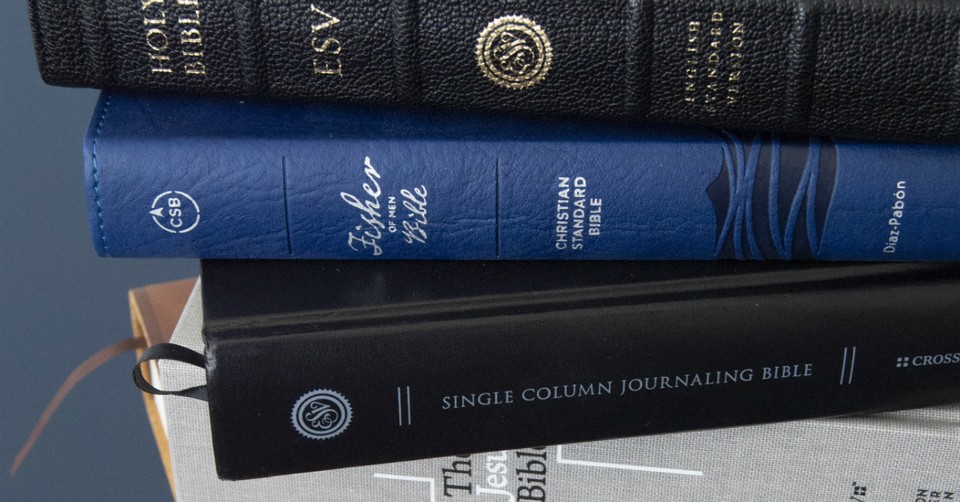What’s Your Bible Translation?

From Hebrew, Greek, and Aramaic, to almost every recognized language known to man. The Bible, written over two thousand years ago and preserved through the ages is still the most sought after book today. Within man is a deep and innate religiosity, a desire to know God, and thus, to have His Word. That takes us to an amusing but potentially important question: what’s your Bible translation?
You and I speak English, but there are various English translations. A multitude, in fact. Some more accurate than others, some more poetic, some more political.
If you own a Bible, how do you rate the translation’s merits? If you are looking to purchase a Bible, how do you know which one to get?
I never really gave much thought to the version I use, not until recently. Someone posed the question and I thought, “Huh. Never really thought about it.” The Christian Standard Bible (CSB) has been my go-to reference when reading at home, on the Bible App, on the internet, and when writing. But who’s to say what the standard is for any Bible?
With so many curious questions afoot, we can try to answer some by taking a dive into the text itself, or multiple texts in this case.
What Is the Bible?
The Bible is God’s Word, a holy text composed of a collection of 66 books and split between the Old Testament (or Torah) and the New Testament. Books included in the Torah detail life before Christ, while those in the New Testament chronicled time during and after the life of Jesus.
While we recognize Scripture as a series of books today, they were written, organized, preserved, and canonized by different people. Some of the text includes songs, and some historical records like letters, and others are eyewitness accounts.
With so many perspectives, there’s plenty of story conveyed in the Bible.
Who Wrote the Bible?
There are many authors responsible for the biblical anthology. About 40 in total. Most have been identified, but a few remain uncertain. Authors include apostles like Matthew, Luke, and Mark, prophets like Moses and Jeremiah, and sages like Solomon.
From each of these writers, we get the original three languages in which Scripture was written, Greek, Hebrew, and Aramaic. Chances are, none of these are your native tongue, or even a language that you speak. That’s the original impetus for why the Bible was translated, to expose more people to a life-changing truth.
“Jesus came near and said to them, ‘All authority has been given to me in heaven and on earth. Go, therefore, and make disciples of all nations, baptizing them in the name of the Father and of the Son and of the Holy Spirit, teaching them to observe everything I have commanded you. And remember, I am with you always, to the end of the age.’” (Matthew 28:18-20)
Who Translated the Bible?
Bible translations have occurred throughout the ages for good and bad reasons. Firstly, language changes over time. Words enter and leave a society’s lexicon naturally. Keeping the Bible’s language updated helps the modern reader comprehend. Furthermore, God’s Word has reached people across the globe, people who speak different languages. Without multiple translations, many people would not be able to read God’s Word.
On the more negative side of things, people have taken to translating Scripture for personal gain, such as the Queen James Version, which alters condemnation of homosexual behavior.
Those responsible for Bible translations include scholars who deliberate, debate, and research the text. The act of translating isn’t perfect and requires extensive effort because of the dynamic nature of language. Not every word or idea translates well from culture to culture. The further we get from the past, the more true this becomes.
From the myriad of translations available in the English language, some strive to be totally accurate word for word, while others attempt to paraphrase in a more coherent way. There’s an entire spectrum to discern.
What Explains People’s Preferences?
Ask anyone about their Bible preferences and their answer will likely fall into one of these categories.
Comfort
If you’re used to reading a particular translation, why change? This is especially true when your church reads from the same text every Sunday or if you were given a Bible as a gift. What you become accustomed to becomes the norm, including the Bible you read.
Accuracy
Faithfulness to truth matters to believers, and rightfully so. If the Bible is God’s Word, then our job is to make sure that the book we read is a reflection of truth, objective truth. Not our own or anyone else’s. Any difference in accuracy is a difference from that duty.
Understandability
Some translations strive to retell the Bible word for word from the original languages, while others paraphrase. Whichever we prefer, our nature is to read and keep books that we understand.
Language
The Bible we read will be a reflection of how we speak day to day. Most people aren’t totting the King James Version of Scripture for a reason. Bibles mirroring our language help us understand the text we read and commit those words to memory. The less we understand what we read, the less likely we are to recall, especially in our times of need.
Which Translation Is Best?
The only way to answer this question is subjectively. Certainly, there are some Bibles you could disregard as inaccurate, especially if a verse reads differently from translation to translation. Choose the one that is most accurate.
However, if you have two accurate books, then the best translation comes down to your personal preference. The point of having Scripture is to know God. If reading your current Bible helps you grow in the faith, then you’re in good shape. You could then technically consider what you have to be your best translation.
What’s in Your Bible?
I used to read the King James Bible, but that was a doozy to understand. Then someone gave me a CSB translation, and for no other reason than that, did I stick with that iteration. What about you, what’s in your Bible?
Our goal as believers should be seeking to know God and His Word, avoiding anything and anyone that would take us off the path towards righteousness. With the proper text in our hands, we keep the proper thoughts in our minds. And from there, we can rest assured, a life devoted to God awaits.
“All Scripture is inspired by God and is profitable for teaching, for rebuking, for correcting, for training in righteousness, so that the man of God may be complete, equipped for every good work.” (2 Timothy 3:16-17)
Photo Credit: ©Sparrowstock

Get in touch with him at aarondanthony.com and check out his debut short story anthology Honey Dreams on Amazon and Barnes and Noble.
Originally published March 20, 2023.




